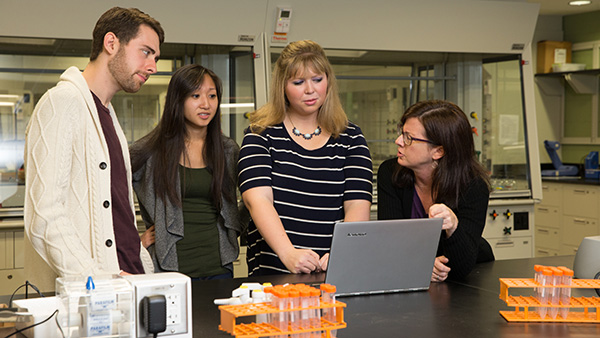
References and Resources

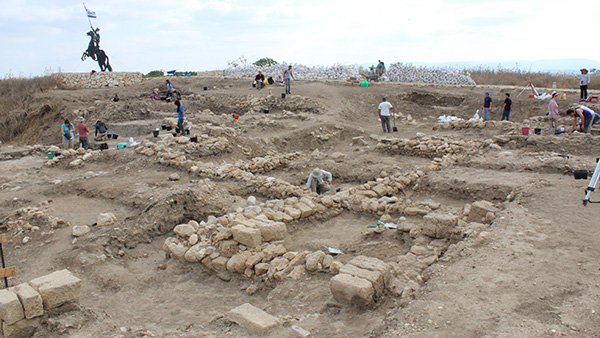
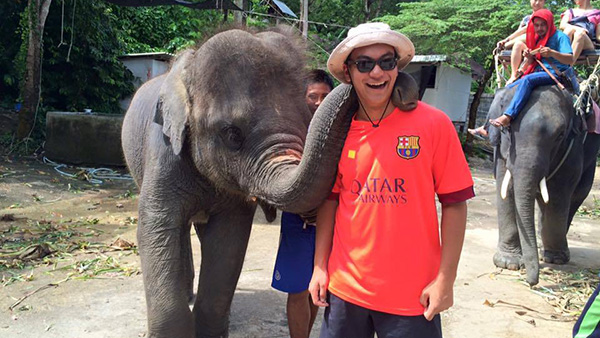
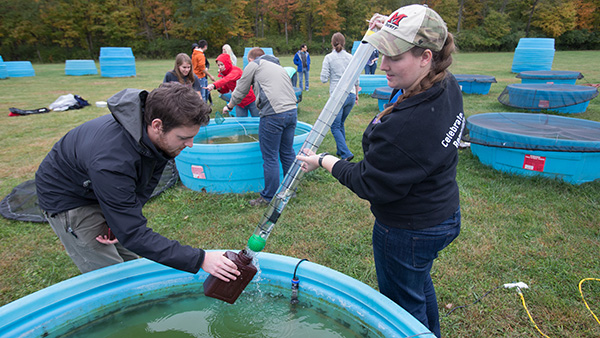
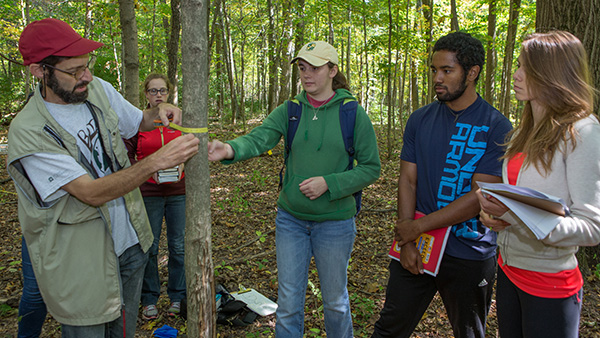
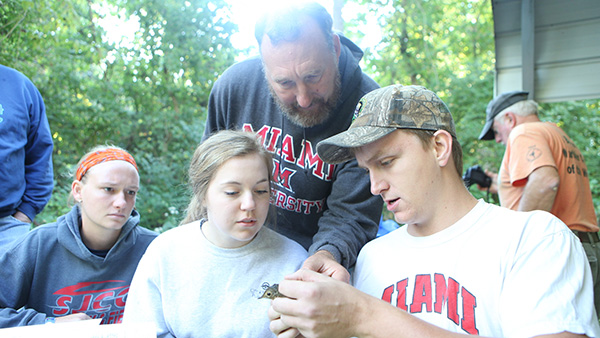
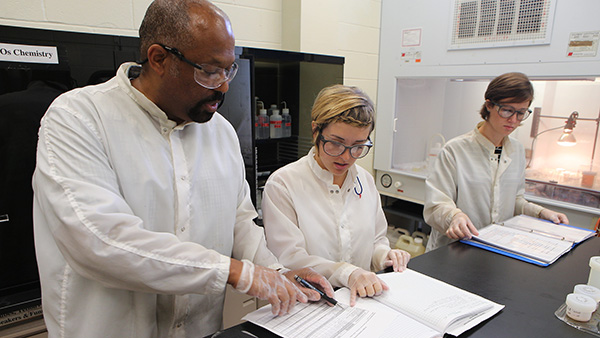
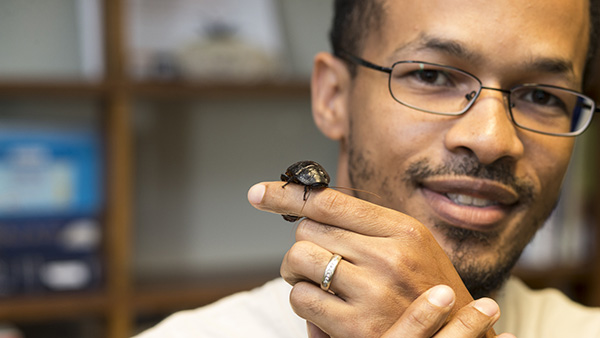
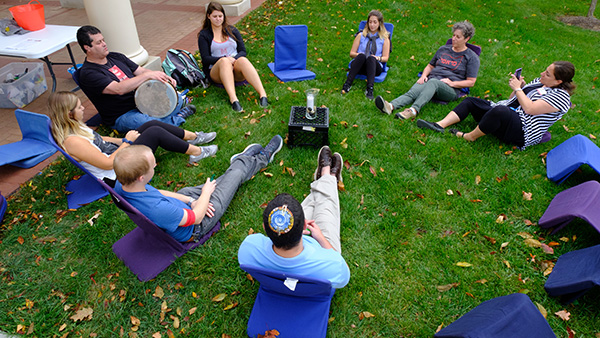
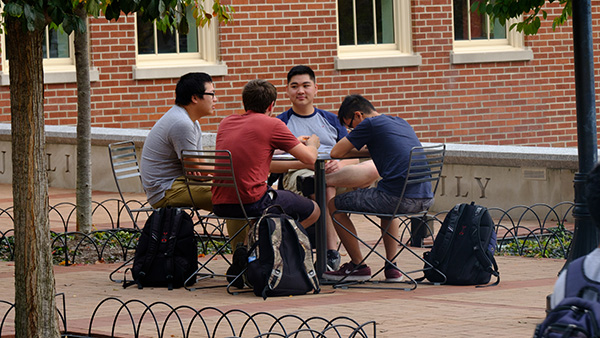
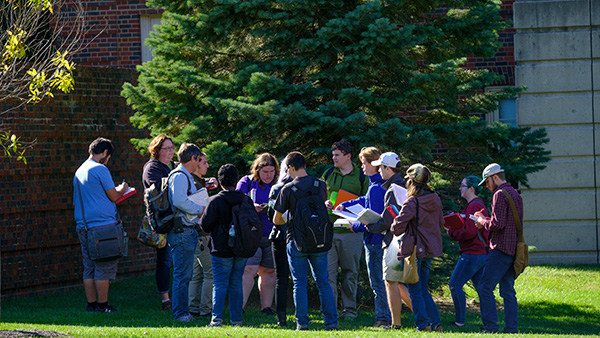
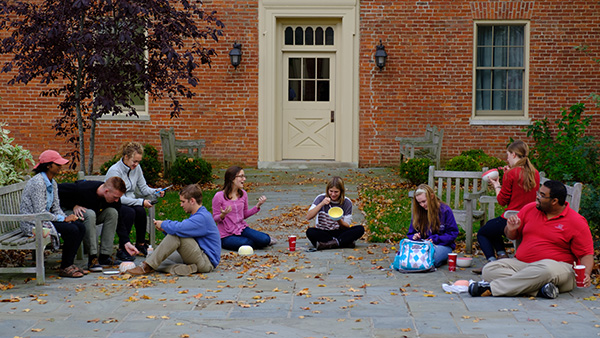
National Resources
- Journal of Experiential Education: Published four times a year, the Journal of Experiential Education (JEE) is a peer-reviewed, scholarly journal presenting a diverse range of articles in subject areas such as outdoor adventure programming, service learning, environmental education, therapeutic applications, research and theory, the creative arts, and more. https://www.aee.org/jee
- Association for Experiential Education https://www.aee.org/
- National Society for Experiential Education: https://www.nsee.org/
- The Council for Adult and Experiential Learning: https://www.cael.org
- World Association for Cooperative Education (WACE): https://www.waceinc.org/
Resource for Tools, Skills, and Strategies
- Experiential Learning & Experiential Education: Philosophy, Theory, Practice Resources
- Learn Through Experience: http://learnthroughexperience.org/
- National Service-Learning Clearinghouse
- Service Learning and Faculty Development (Campus Compact )
Miami University Resources
- 5 Transformative Teaching Practices MP4 with L.Dee Fink. International Lilly Conference November 15, 2012. http://celt.miamioh.edu/cte/video/Fink_2012.mp4
- Create & Innovate Miami University Libraries King 303 http://lib.miamioh.edu
- Center for Civic Engagement (Miami Hamilton campus) https://miamioh.edu/regionals/student-life/center-civic-engagement/index.html
- Collette Loskoch Thompson, Regional Director of Civic Education, Miami University Regionals, Center for Civic Education, collette@miamioh.edu 513-785-3015
Faculty and Staff Utilizing Experiential Learning
Sharing resources and experiences across academic disciplines can help when considering integrating experiential learning. The Miami faculty and staff who were involved in developing this online resource are all utilizing experiential learning to engage students. Feel free to contact these individuals as resources as you consider planning an experiential learning experience.
Gabriela Bermudez, College of Arts & Science Advising, bermudg@miamioh.eduCo-curriculum, experiential learning and assessment
Service-Learning
Evelyn Covington, Orientation and Transition Programs, covinged@miamioh.edu
Stephanie Danker, Department of Art, dankers@miamioh.edu
Social justice art education, art integration, teacher professional development, civic engagement, reflective practice
Karleah Harris, Department of Family Science and Social Work, harri128@miamioh.edu
Claire McLeod, Department of Geology and Environmental Earth Science, mcleodcl@miamioh.edu
Mysore Narayanan, Engineering, narayam@miamioh.edu
Engineering Design and Service Learning
Engineering Analysis and Experiential Learning
Field Project Assignments with Local and Regional Schools
Student Missions Supporting STEM (Science, Technology, Engineering and Mathematics) Projects Supporting WIMSE ( Women In Mathematics, Science and Engineering)
Amy Restorick Roberts, Department of Family Science and Social Work, rober128@miamioh.edu
Service-learning opportunities with students and older adults
Experiential learning activities in the classroom
Jacqueline Rioja Velarde, associate director, Center for American & World Cultures, Global Initiatives, riojavjd@MiamiOH.edu
Co-curriculum, experiential learning and assessment
Service-Learning
Re-entry study abroad
Study away, field study and fieldwork in Geographical learning
Continuing education and experiential learning
Experiential learning and Universal design for learning
Terri Spahr Nelson, Department of Family Science and Social Work, nelsont@miamioh.edu
Be the Change community advocacy project for marginalized/oppressed populations
Social Work Week and Family Science and Social Work Week
Experiential Group work in the classroom
References
Alberta B. et. al. (nd) Experiential Learning Report. Cornell University. https://cals.cornell.edu/about/leadership/oap/teaching/elr/report (Retrieved 3.20.19).
Association for Experiential Education. https://www.aee.org/
Anand, J., Mulotte,L., and Ren, C.R., (2015). Does experience imply learning? Strategic Management Journal, v. 37(7), 1395-1412.
Anupam, A., Gupta, R., Naeemi, A., and Jafari Naimi, N., (2017). Particle in a Box: An Experiential Environment for Learning Introductory Quantum Mechanics. IEEE Transactions on Education, v. 61(1), 29-37.
Ashby, N. J. S., Konstantinids, E., and Yechiam, E., (2017). Choice in experiential learning: True preferences or experiential artifacts? Acta Psychologica, v. 174, 59-67.
Audet, J., and Marcotte, G., (2018). Student Trade Missions: An experiential learning opportunity. American Journal of Business Education, 11, 1-14.
Austin, J. M., and Rust, D. Z., (2015). Developing an experiential learning program: Milestones and challenges. International Journal of Teaching and Learning in Higher Education, 27(1), 143-153.
Baird, B., (2018). Majoring in the Minor: A Closer Look at Experiential Learning. Honors in Practice – Online Archive, 285.
Baker, M. A., and Shane, R. J., (2017). The effects of an experiential approach to learning on student motivation. Journal of Agricultural Education, 58, 150-167.
Bamber, D., and Harding, S., (2018). Understanding Organizational Values Through Experiential Learning. In: Hyams-Ssekasi D., Caldwell E. (eds) Experiential Learning for Entrepreneurship. Palgrave Macmillan, Cham.
Banach, M., Fodem E., and Carter, V. B., (2019). Educating undergraduate group workers: increasing confidence through experiential learning. Social Work with Groups, 42(2), 158-170.
Barkley E.F., Major C.H., & Cross K.P. (2014), Collaborative learning techniques: a handbook for college faculty. San Francisco, CA: Jossey Bass.
Bartels, K. P. R., and Wagenaar, H., (2017). Doubt and excitement: an experiential learning approach to teaching the practice of qualitative research. Qualitative Research, v. 18(2), 191-206.
Bata, M., Cox-Lanyon, V., Davis, M., and Whitney, A., (2019). When a student's "right to fail" harms the university: How a lack of guidance in experiential learning affects university-organization relationships. Journal of Management Education, 43(1), 108-120.
Baxter, J. E., (2016). Structuring Experiential Learning in the Field, Chapter 4 In Archeological Field Schools, A Guide for Teaching in the Field, Taylor & Francis, 14pp.
Beard, Colin., & Wilson, John. P. (2002). The Power of Experiential Learning: A Handbook for Trainers and Educators. Stylus Publishing
Beard, Colin., & Wilson, John. P. (2013). Experiential learning: A handbook for education, training, and coaching. (3rd Edition). Philadelphia, PA: Kogan Page Limited.
Bennett, D., Sunderland, N., Bartleet, B. & Power, A. (2016). Implementing and sustaining higher education Service-Learning initiatives: Revising Young et al.'s organizational tactics. Journal of Experiential Education, 39(2), 145-163.
Bhatti, W. A., Larimo, J., and Coudounaris, D. N., (2016). The effect of experiential learning on subsidiary knowledge and performance. Journal of Business Research, 69(5), 1567-1571.
Bitting, K. S., McCartney, M. J., Denning, K. R., and Roberts, J. A., (2018). Conceptual learning outcomes of virtual experiential learning: Results of google earth exploration in introductory geoscience courses. Research in Science Education, 48, 533-548.
Blodgett, J., (2017). Taking the Class Out of the Classroom: Libraries, Literacy, and Service Learning. The Experiential Library, Transforming Academic and Research Libraries Through the Power of Experiential Learning, Chapter 4, 43-52.
Bos, L., McCabe, S., and Johnson, S., (2013). Learning never goes on holiday: An exploration of social tourism as a context for experiential learning. Current issues in tourism, 18(9), 859-875.
Bradford, D. L., (2018). Ethical issues in experiential learning. Journal of Management Education, 43(1), 89-98.
Bossaller, J. (2016). Service-Learning as innovative pedagogy in online learning. Education for Information, 32, 35-53.
Bradford, D. L. (2019). Ethical issues in experiential learning. Journal of Management Education, 43(1), 89-98.
Brown, C., Willett, J., Goldfine, R., and Goldfine, B., (2018). Sport management internships: Recommendations for improving upon experiential learning. Journal of Hospitality, Leisure, Sport & Tourism Education v. 22, 75-81.
Burch, G., Giambatista, R. C., Batchelor, J., Hoover, J. D., Burch, J., Heller, N., and Shaw, J., (2017). Do Experiential Learning Pedagogies Effect Student Learning? A Meta-Analysis of 40 Years of Research. Academy of Management Proceedings, v. 2016(1).
Bureau, D. A., Cole, J. S. & McCormick, A. C. (2014). Frequent participation in Service-Learning: Examining institutional differences and individual benefits. New Directions for Institutional Research, 162, 17-27.
Bursztyn, N., Walker, A., Shelton, B., and Pederson, J., (2017). Assessment of student learning using augmented reality Grand Canyon field trips for mobile smart devices. Geosphere, 13(2), 260-268.
Cabiati, E., and Folgheraiter, F., (2018). Let's try to change ourselves first. An action-research on experiential learning with social work students. Social Work Education, The International Journal.
Campores, T., Catalano, G., Florio, M., and Giffoni, F., (2017). Experiential learning in high energy physics: A survey of students at the LHB. European Journal of Physics, 38(2).
Cantor, J. A. (1995). Experiential learning in higher education. Washington, DC: ASHE-ERIC Higher Education Report No. 7.
Carey, L. (2007). Teaching macro practice: An experiential learning project. Journal of Teaching in Social Work, 27(1/2), 61-71. DOI:10.1300/J067v27n01_04
Cohen, M. (2010). Using student task groups to teach group process and development. Social Work with Groups, 34(1), 51-60. DOI: 10.1080/01609513.2010.503384Coker J.S. and Porter D.J. (2015), Maximizing experiential learning for student success. Change: The Magazine of Higher Education. January/February 66-72.
Cooper, J. R. (2014). Ten years in the trenches: Faculty perspectives on sustaining Service-Learning. Journal of Experiential Education, 37(4), 415-428.
Earnest, D. R., Rosenbusch, K., Wallace-Williams, D., and Keim, A. C., (2016). Study abroad I psychology: Increasing cultural competencies through experiential learning. Teaching of Psychology, 43(1), 75-79.
Elijido-Ten, E., and Kloot L., (2015). Experiential Learning in accounting work-integrated learning: a three-way partnership. Education and Training, 57(2), 204-218.
Falk, D. (1995)."Preflection: A Strategy for Enhancing Reflection". Evaluation/Reflection. 22. https://digitalcommons.unomaha.edu/slceeval/22
Fede, J. H., Gorman, K. S., and Cimini, M. E., (2018). Student employment as a model for experiential learning. Journal of Experiential Education, 41(1), 107-124.
Ferguson, J. L., Makarem, S. C., and Jones, R. E., (2015). Using a class blog for student experiential learning reflection in business courses. Journal of Education for Business, 91(1), 1-10.
Finch, D., Peacock, M., Lazdowski, D., and Hwang, M., (2015). Managing emotions: A case exploring the relationship between experiential learning, emotions, and student performances. The International Journal of Management Education, v. 1391), 23-36.
Fischbach, S., and Guerrero, V., (2018). Mobile business retailing; Driving experiential learning on campus. Journal of Marketing Education, 40(1), 56-65.
Fisher, E. E., Sharp, R. L. & Bradley, M. J. (2017). Perceived benefits of Service-Learning: A comparison of collegiate recreation concentrations. Journal of Experiential Education, 40(2), 187-201.
Furco, A. (2002). Institutionalizing Service-Learning in higher education. The Journal of Public Affairs, 1(6), 39-67.
Gao, X., (2015). Promoting experiential learning in pre-service teacher education. Journal of Education for Teaching, 41(5), 435-438.
George, M., Lim, H., Lucas, S., and Meadows, R., (2015). Learning by doing: Experiential learning in criminal justice. Journal of Criminal Justice Education, 26(4), 471-492.
Gerlach, J. D., and Reinagel, T. P., (2016). Experiential learning in MPA programs: A case for complementarity between Internship and service learning requirements. Political Science and Politics, 49(1), 132-138.
Giesen, Janet (October 12, 2011) Experiential Learning. Northern Illinois University. https://facdevblog.niu.edu/experiential-learning (retrieved 3.20.19).
Girvan, C., Conneely, C., and Tangney, B., (2016). Extending experiential learning in teacher professional development. Teaching and Teacher Education, 58, 129-139.
Gould, Laurence J. Experiential Learning in Organization. Applications of the Tavistock Group Relations Approach., Routeledge, 2004.
Grabowsky, G. L., Hargis, J., Davidson, J., Paynter, A., Such, J., and Wright, C., (2017). Coral Reefs, Convicts, Cadavers, Coffee Shops and Couture: Customizing Experiential Learning to Increase Comfort and Engagement. Journal of University Teaching & Learning Practice, v. 14(3), Article #5.
Hayden, M., and McIntosh, S., (2018). International Education: The transformative potential of experiential learning. Oxford Review of Education, 44, 403-413.
Hajshirmohammadi, A., (2017). Incorporating Experiential Learning in Engineering Courses, IEEE Communications Magazine, v. 55(11), 166-169.
Harvey, M., Coulson, D., and McMaugh, A., (2016). Towards a theory of the Ecology of Reflection: Reflective practice for experiential learning in higher education. Journal of University Teaching & Learning Practice, 13(2), 1-20.Henrich, W. F., Habron, G. B., Johnson, H. L., and Goralnik, L., (2015). Critical thinking assessment across four sustainability-related experiential learning settings. Journal of Experiential Education, 38(4). 373-393.
Herremans, I. M., & Murch, R. (2003). Multidisciplinary decision making through experiential learning: Perspectives from practical trials. Innovative Higher Education, 28(1), 63.
Hessenauer, S., & Zastow, C. (2013). Becoming a social worker: BSW social workers' educational experiences. Journal of Baccalaureate Social Work, 18, 19-35.
Hesser G. (1995). Faculty assessment of student learning: Outcomes attributed to service learning and evidence of changes in faculty attitudes about experiential education. Michigan Journal of Community Service Learning, 2(1), 33-41.
Hoover, J. D., & Whitehead, C. (1975). An experiential-cognitive methodology in the first course in management: Some preliminary results. Simulation Games and Experiential Learning in Action, 2. Retrieved from https://journals.tdl.org/absel/index.php/absel/article/view/2787
Hou S. and Wilder S. (2015), How ready is higher education faculty for engaged student learning? Applying transtheoretical model to measure service-learning beliefs and adoption. Sage Open. January-March: 1-9.
Huang, T-C., Chen, C-C., and Chou, Y-W., (2016). Animating eco-education: To see, feel, and discover in an augmented reality-based experiential learning environment. Computers & Education, 96, 72-82.
Huber, M. & Hutchings, P. (2004). Mapping the Terrain. Washington, DC: the Association of American Colleges and Universities https://eric.ed.gov/?id=ED486247
Hutchinson, S., and Lawrence, H. Playing with Purpose. How Experiential Learning Can Be More Than a Game. Taylor & Francis, 2017.
Huynh, T., Hou, G., and Wang, J., (2016). Communicating wave energy: An active learning experience for students. American Journal of Engineering Education, 7(1), 37-46.
Jacoby, B. (2015). Service-Learning Essentials: Question, Answers and Lessons Learned. San Francisco, CA: Jossey-Bass https://learning.oreilly.com/library/view/service-learning-essentials-questions/9781118944011/copyright.xhtml
Jose, S., Patrick, P. G., and Moseley, C., (2016). Experiential learning theory: the importance of outdoor classrooms in environmental education. International Journal of Science Education, Part B, Communication and Public Engagement, v. 7(3), 269-284.
Journal of Experiential Education https://journals.sagepub.com/home/jee
Kang, D. Y., and Martin, S. N., (2018). Improving learning opportunities for special education needs (SEN) students by engaging pre-service science teachers in an informal experiential learning course. Asia Pacific Journal of Education, 38(3), 319-347.
Kaye, C. B. (2004). The complete guide to Service-Learning: Proven, practical ways to engage students in civic responsibility, academic curriculum, and social action. Minneapolis, MN: Free Spirit.
Kisfalvi, V., and Oliver, D., (2015). Creating and maintaining a safe space in experiential learning. Journal of Management Education, 39(6), 713-740.
Koivisto, J-M., Niemi, H., Multisilta, J., and Eriksson, E., (2015). Nursing students' experiential learning processes using an online 3D simulation game. Education and Information Technologies, 22(1), 383-393.
Kolb, D. A. (1984). Experiential learning: Experience as the source of learning and development. Englewood Cliffs, NJ: Prentice Hall.
Kolb, A. Y., & Kolb, D. A. (2005). Learning styles and learning spaces: Enhancing experiential learning in higher education. Academy of management learning & education, 4(2), 193-212.
Kolb, A. Y., and Kolb, D. A., (2008). The learning way: Meta-cognitive aspects of experiential learning. Stimulation & Gaming, 40(3), 297-327.
Kurpis, L. H., and Hunter, J., (2016). Developing students’ cultural intelligence through an experiential learning activity: A cross-cultural consumer behavior interview. Journal of Marketing Education, 39(1), 30-46.
Lam, T. C. M., Kolomitro, K., & Alamparambil, F. C. (2011). Empathy training: Methods, evaluation practices, and validity. Journal of MultiDisciplinary Evaluation, 7(16), 162–200.
Lewis, L. H., & Williams, C. J. (1994). Experiential learning: Past and present. In L. Jackson & R. S. Caffarella (Eds.), Experiential learning: A new approach, (pp. 5-16). San Francisco, CA: Jossey-Bass.
Lim, S. & Bloomquist, C. (2014/2015). Distinguishing service-learning from other types of experiential learning. Education for Information, 31, 195-207.
Lazar, K. B., Moysey, S. M., Brame, S., Coulson, A. B., Lee, C. M., and Wagner, J. R., (2017). Breaking out of the traditional lecture hall: Geocaching as a tool for experiential learning in large geology service courses. Journal of Geoscience Education, 66(3), 170-185.
Le, Q. T., Pedro, A., and Park., C. S., (2015). A Social Virtual Reality Based Construction Safety Education System for Experiential Learning, v. 79(3-4); 487-506.
Li, M., and Armstrong, S. J., (2015). The relationship between Kolb's experiential learning styles and Big Five personality traits in international managers. Personality and Individual Differences, v. 86, 422-426.
Lockeman, Kelly & Pelco, Lynn. (2013). The Relationship between service-learning and degree completion. Michigan Journal of Community Service Learning, 20,18-30.
McDonald, M. A., & Spence, K. (2016). Experiential learning: Impacting student lateral and vertical development. Sport Management Education Journal, 10, 140-147.
McKinney, J., O'Connor, V., & Pruitt, D. (2018). Experiential Learning through Group Work and Theater. Social Work with Groups, v. 41(1-2), 49-59.
Mahatmya, D., Thurston, M., & Lynch, M. E. (2018). Developing students' well-being through integrative, experiential learning courses. Journal of Student Affairs Research and Practice, 55(3), 295-307.
Martin, Andy and Franc, Dan Outdoor and Experiential Learning. An Holistic and Creative Approach to Programme Design. Routeledge, 2004.
Matsuo, M., (2015). A Framework for Facilitating Experiential Learning. Human Resource Development Review, v. 14(4), 442-461.
Moon, Jennifer A. (2004). A handbook of reflection and experiential learning: Theory and practice. New York: Routledge.
Miller, R. J., and Maellaro, R., (2016). Getting to the Root of the Problem in Experiential Learning: Using Problem Solving and Collective Reflection to Improve Learning Outcomes, v. 40(2), 170-193.
Munge, B., Thomas, G., & Heck, D. (2018). Outdoor fieldwork in Higher Education: Learning from multidisciplinary experience. Journal of Experiential Education, 41(1), 39-53.
Najmr, S., Chae, J., Greenberg, M. L., Bowman, C., Harkavy, I., & Maeyer, J. R. (2018). A service-learning chemistry course as a model to improve undergraduate scientific communication skills. Journal of Chemical Education, 95(4), 528-534.
Northern Illinois University, Faculty Development and Instructional Design Center (nd) Experiential Learning. www.niu.edu/facdev (retrieved 3.20.19).
Pawson, Eric. (2016). Classrooms without borders: new spaces and places of learning, Journal of Geography in Higher Education, 40:1, 14-30, DOI: 10.1080/03098265.2015.1116062
Petrovic-Dzerdz, M., & Trepanier, A., (2018). Online hunting, gathering and sharing – A return to experiential learning in a digital age. The International Review of Research in Open and Distributed Learning, 19(2).
Remmen K.B., & Froyland M. (2014). Implementation of guidelines for effective fieldwork designs: Exploring learning activities, learning processes, and student engagement in the classroom and the field. International Research in Geographical and Environmental Education, 23(2), 103-125.
Rodriguez, C, M., (2018). A method for experiential learning and significant learning in architectural education via live projects. Arts & Humanities in Higher Education, v. 17(3), 279-304.
Rosenstein A., Sweeney C., & Gupta, R. (2012), Cross disciplinary faculty perspectives on experiential learning. Contemporary Issues in Educational Research, 5(3), 139144.
Restorick, Roberts, Amy, Sellers, Sherrill L., Franks, Kelly, and Spahr Nelson, Terri. (2018) Teaching Note-Social Work Week: Harnessing the Potential of Group Practice to Achieve Transformational Learning, Journal of Social Work Education, 54:3, 561 567, DOI: 10.1080/10437797.2018.1434431
Savage, E., Tapics, T., Evarts, J., Wilson, J., & Tirone, S., (2015). Experiential learning for sustainability leadership in higher education. International Journal of Sustainability in Higher Education, 16, 692-705.
Schreiber, J., Moerchen, V. A., Rapport, M. J., Martin, K., Furze, J., Lundee, H., & Pelletier, E., (2015). Experiential Learning With Children: An Essential Component of Professional Physical Therapy Education, v. 27(4), 356-367.
Schwartz, M. (2012). Best practices in experiential learning. Retrieved from https://www.ryerson.ca/content/dam/lt/resources/handouts/ExperientialLearningReport.pdf
Semken, S., Ward, E. G., Moosavi, S., and Chinn, P. W. U., (2017). Place-based education in Geoscience: Theory, research, practice, and assessment. Journal of Geoscience Education, 65(4), 542-562.
Sheptak Jr, R. D., &Menaker, B. E., (2016). Learning and working with the pros: Student perspectives on an embedded experiential learning project. Journal of Hospitality, Leisure, Sport & Tourism Education, 19, 104-114.
Slavich, G. & Zimbardo, P. (2012). Transformational teaching: Theoretical underpinnings, basic principles, and core methods. Educational Psychology Review, 24, 569-608. DOI: 10.1007/s10648-012-9199-6
Sojka J. Z. (2016). Use of In-Class Experiential Learning to Promote Student Engagement. In: Kim K. (eds) Celebrating America's Pastimes: Baseball, Hot Dogs, Apple Pie and Marketing?. Developments in Marketing Science: Proceedings of the Academy of Marketing Science. Springer.
Sutton, J., & Kaufmann, R., (2018). That's a myth! Teaching about disaster myths through experiential Learning. International Journal of Mass Emergencies and Disasters, 36(3), 287-296.
Tomkins, L., and Ulus, E., (2016). 'Oh, was that "experiential learning"?!' Space, synergies and surprises with Kolb's learning cycle. Management Learning, 47(2), 158-178.
Toews, M. & Cerny, J. (2006). The impact of service learning on student development. Marriage and Family Review, 38(4), 79-96. DOI: 10.1300/J002v38n04_05
University of California Davis (UC Davis). (2011). 5-step experiential learning cycle definitions. http://www.experientiallearning.ucdavis.edu/module1/el1_40-5step-definitions.pdf
Van den Bemt, V., Doornbos, J., Meijering, L., Plegt, M., & Theunissen, N., (2017). Teaching ethics when working with geocoded data: A novel experiential learning approach. Journal of Geography in Higher Education, 42(2), 293-310.
Vaughn, K. L., Vaughn, R. E., and Seeley, J. M., (2017). Experiential learning in soil science: Use of an augmented reality sandbox.Natural Sciences Education, 46, 1-5.
Weigert, K. M. (1998). Academic service-learning: Its meaning and relevance. New Directions for Teaching and Learning, 73, 3-10.
Whitley, M. A., Walsh, D., Hayden, L., & Gould, D., (2017). Narratives of experiential learning: Students' engagement in a physical activity-based service-learning course. Journal of Teaching in Physical Education, 36(4), 419-429.
Williams, D. (2016). The "real" truth about Service-Learning: College sophomores' perspectives. Delta Kappa Gamma Bulletin, 82(4), 1-10.
Wilson, J. R., Yates, T. T., and Kendra, P.(2018). Performance, preference, and perception in experiential learning assessment. Canadian Journal for the Scholarship of Teaching and Learning, 9(2), Article #5.
Wozencroft, A. J., Pate, J. R., & Griffiths, H. K. (2014). Experiential learning and its impact on students' attitudes toward youth with disabilities. Journal of Experiential Education, 38(2), 129-143.
Wright, A., Hibbert, P., Strong, R., & Edwards, M. (2018). Exposing practical, psychological, and pedagogical experiential learning. Journal of Management Education, 42(6), 761-771.
Wurdinger, S. D. (2005). Using experiential learning in the classroom. Lanham, MD: Scarecrow Education.
Wurdinger S.D., & Carlson J.A. (2009). Teaching for experiential learning: five approaches that work. Lanham, MD: Rowman and Littlefield Publishers.
Wurdinger, S. & Allison, P. (2017). Faculty perceptions and use of experiential learning In higher education. Journal of e-Learning and Knowledge Society, 13(1).
Yeo, R. K., & Marquardt, M. J.(2015). (Re) Interpreting Action, learning, and experience: integrating action learning and experiential learning for HRD. Human Resource Development Quarterly, 26(1), 81-107.
Zapalska, A. M., Jackson, H., & Zelmanowitz, S. (2016). Framework for leadership skills development with experiential learning: An example of an undergraduate engineering program. International Journal of Science and Engineering Investigations, 5(57), 39-44.

